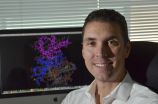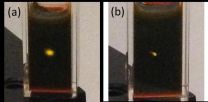The peer-reviewed research brief describes a female patient with advanced soft tissue sarcoma widely metastatic to the lungs. The patient's physician submitted a tumor specimen to Foundation Medicine for comprehensive genomic profiling with FoundationOne® Heme, where her cancer was demonstrated to harbor a TRK gene fusion. Following multiple unsuccessful courses of treatment, the patient was referred to the University of Colorado for enrollment in the Phase 1 trial of LOXO-101 in March 2015. On study, the patient's shortness of breath rapidly resolved and she was able to discontinue her supplemental oxygen and resume activities of daily living. Imaging studies following one month of treatment, the first imaging studies conducted post-treatment, confirmed that her tumors had substantially regressed, meeting a partial response (PR) definition by standard RECIST 1.1 criteria. As discussed in the publication, with 4 months of treatment, additional CT scans demonstrated almost complete tumor disappearance of the largest tumors. After 4 months of dosing, the patient did not have any adverse events that were attributed to LOXO-101.
"It is exciting to think that TRK fusions may join a relatively short, but growing, list of actionable oncogenic drivers found across human cancer," said lead author Robert C. Doebele, M.D., Ph.D., LOXO-101 clinical investigator, and University of Colorado Cancer Center member. "To see a rapid and unequivocal response in the first TRK fusion patient treated with LOXO-101 provides early but encouraging validation of this target. Of course, it will be important to see repeatable and durable results as more patients with TRK fusions are treated over time. This case study also illustrates the clinical value of multiplex genetic testing in patients with advanced cancer. Broad testing for all known actionable molecular alterations gives patients the best opportunity to find commercially available or investigational targeted therapies that have been rationally designed to treat their cancers."
The publication also describes novel assays for assessing LOXO-101's impact on TRK signaling, patient-derived TRK fusion models in vitro and in vivo which illustrate LOXO-101's TRK inhibition, and the first-ever description of the molecular epidemiology of TRK fusions in soft tissue sarcoma.
LOXO-101, built specifically to inhibit TRK, is currently being studied in a Phase 1 trial of patients with advanced solid tumors. The trial continues to enroll patients at escalating oral doses of fixed once-daily and twice-daily regimens. As reported at the 2015 American Association for Cancer Research (AACR) meeting, LOXO-101 has been well tolerated with no drug-related adverse event signals reported at doses that consistently achieve systemic drug exposures anticipated to inhibit TRK signaling by over 90 percent. For more information on the Phase 1 trial, including study sites and eligibility criteria, visit clinicaltrials.gov (study identifier NCT02122913), or contact the Loxo Oncology Physician and Patient Clinical Trial Hotline at 1-855-NTRK-123. Loxo Oncology's Policy for Access to Investigational Agents can be found on the Loxo Oncology web site.
"TRK is increasingly recognized for its role in cancer biology, and this first peer-reviewed clinical validation is an important step forward," said Jennifer Low, M.D., Ph.D., chief medical officer of Loxo Oncology. "We continue to be encouraged by the safety and pharmacokinetics we have seen so far in the LOXO-101 Phase 1a trial, and we look forward to sharing more information about our clinical program later this year."
"Our goal is to better understand the genetic drivers of sarcoma to improve treatment options for patients," said Lara E. Davis, M.D., a medical oncologist and sarcoma specialist with the OHSU Knight Cancer Institute. "These early results validate that further study of TRK in the complex field of sarcoma is warranted."
INFORMATION:
The research presented in the publication is funded by a V Foundation Scholar Award and a Loxo Oncology research grant awarded to Dr. Robert C. Doebele. Also, the State of Colorado and University of Colorado Technology Transfer Office Bioscience Discovery Evaluation Grant Program, the University of Colorado Lung Cancer SPORE (funded by the National Cancer Institute (NCI) of the National Institutes of Health (NIH) grant P50CA058187 provided funding to Dr. Doebele and the NIH/NCI CCSG P30CA046934 (Molecular Pathology Shared Resource) provided funding to Drs. Varella-Garcia and Aisner.
About LOXO--101
LOXO-101 is a potent, oral, selective inhibitor of tropomyosin receptor kinase (TRK) signaling molecules. The TRK family (TRKA, TRKB, and TRKC) has been implicated in diverse tumor types such as lung cancer, head and neck cancer, melanoma, colorectal cancer, sarcoma, and breast cancer. LOXO-101 was built specifically to inhibit TRK and is currently the only selective TRK inhibitor in clinical development. LOXO-101 is currently being evaluated in a Phase 1 dose escalation trial for patients with advanced solid tumors.
About Loxo Oncology
Loxo Oncology is committed to the discovery, development, and commercialization of targeted cancer therapies with best-in-class potential. Our diverse pipeline reflects the convergence of proven therapeutic technologies with emerging insights into the underlying susceptibilities of cancer and drug resistance. We leverage the expertise of our partners in academia and industry and our management team's deep clinical-regulatory experience to deploy focused clinical development strategies in well-defined patient populations. Our goal is to create important new cancer therapies as efficiently as possible to substantially benefit patients. http://www.loxooncology.com
About University of Colorado Cancer Center
The University of Colorado Cancer Center, located at the Anschutz Medical Campus, is Colorado's only National Cancer Institute-designated comprehensive cancer center, a distinction recognizing its outstanding contributions to research, clinical trials, prevention and cancer control. CU Cancer Center's clinical partner for adult care, University of Colorado Hospital is ranked 15th by U.S. News and World Report for cancer care and Children's Hospital Colorado is ranked 9th by the same organization. The CU Cancer Center is a member of the prestigious National Comprehensive Cancer Network®, an alliance of the nation's leading cancer centers working to establish and deliver the gold standard in cancer clinical guidelines. CU Cancer Center also is a member of the Oncology Research Information Exchange Network (ORIEN), a unique research partnership among North America's top cancer centers leveraging multiple data sources and matching patients to targeted treatments. CU Cancer Center is a consortium of approximately 400 researchers and physicians at three state universities and three clinical institutions, all working toward one goal: Translating science into life. For more information visit Coloradocancercenter.org and follow CU Cancer Center on Facebook and Twitter.
Forward looking statements
This press release contains "forward-looking" statements within the meaning of the safe harbor provisions of the U.S. Private Securities Litigation Reform Act of 1995. Forward-looking statements can be identified by words such as: "anticipate," "intend," "plan," "goal," "seek," "believe," "project," "estimate," "expect," "strategy," "future," "likely," "may," "should," "will" and similar references to future periods. These statements are subject to numerous risks and uncertainties that could cause actual results to differ materially from what we expect. Examples of forward-looking statements include, among others, statements we make regarding our future financial performance, business plans and objectives, partnerships, timing and success of our clinical trials, our ability to obtain regulatory approval, the potential therapeutic benefits and economic value of our lead product candidate or pipeline candidates, potential growth opportunities, financing plans, competitive position, industry environment and potential market opportunities. Further information on potential risk factors that could affect our business and its financial results are detailed in our most recent Quarterly Report on Form 10-Q, and other reports as filed from time to time with the Securities and Exchange Commission. We undertake no obligation to publicly update any forward-looking statement, whether written or oral, that may be made from time to time, whether as a result of new information, future developments or otherwise.


